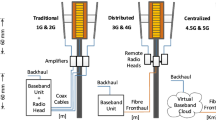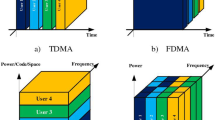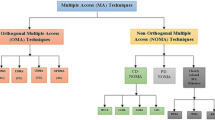Abstract
Uplink scheduling in OFDMA systems with imperfect CSI is investigated. An efficient CSI quantization scheme is proposed and shown to achieve good performance with a limited number of quantization bits in the perfect CSI scenario. The probability of error in quantizing imperfect CSI is studied and analytical formulas are derived. Simulation results are presented and show that the errors in estimating the CSI are to a large extent absorbed by the quantization error and the performance with quantized imperfect CSI is close to full CSI even with a reduced number of quantization bits.






Similar content being viewed by others
References
C.Y. Wong, R.S. Cheng, K.B. Letaief, and R.D. Murch, Multiuser OFDM with adaptive subcarrier, bit and power allocation. IEEE Journal on Selected Areas in Communications, Vol. 17, No. 10, pp. 1747–1757, 1999.
G. Song and Y. Li, Adaptive subcarrier and power allocation in OFDM based on maximizing utility. In: IEEE VTC-Spring, Vol. 2, pp. 905–909, 2003.
I.C. Wong and B.L. Evans, Optimal OFDMA resource allocation with linear complexity to maximize ergodic weighted sum capacity. In: IEEE International Conference on Acoustics, Speech, and Signal Processing, Vol. 2, pp. 601–604, April 2007.
X. Wang and G.B. Giannakis, Ergodic capacity and average rate-guaranteed scheduling for wireless multiuser OFDM systems. In: IEEE ISIT 2008, July 2008.
K. Kim, Y. Han, and S.-L. Kim, Joint subcarrier and power allocation in uplink OFDMA systems. IEEE Communications Letters, Vol. 9, No. 6, pp. 526–528, June 2005.
H.G. Myung, J. Lim, and D.J. Goodman, Single carrier FDMA for uplink wireless transmission. IEEE Vehicular Technology Magazine, Vol. 48, No. 1, pp. 30–38, September 2006.
C.Y. Ng and C.W. Sung, Low complexity subcarrier and power allocation for utility maximization in uplink OFDMA systems. IEEE Transactions on Wireless Communications, Vol. 7, No. 5, pp. 1667–1675, May 2008.
A.M. El-Hajj, E. Yaacoub, and Z. Dawy, Uplink OFDMA resource allocation with ergodic rate maximization. In: IEEE PIMRC 2009, September 2009.
K.I. Pedersen, G. Monghal, I.Z. Kovacs, T.E. Kolding, A. Pokhariyal, F. Frederiksen, and P. Mogensen, Frequency domain scheduling for OFDMA with limited and noisy channel feedback. In: IEEE VTC-Fall 2007, October 2007.
P. Svedman, S.K. Wilson, L.J. Cimini, and B. Ottersten, A simplified opportunistic feedback and scheduling scheme for OFDMA. In: IEEE VTC-Spring 2004, May 2004.
S. Sanayei, A. Nosratinia, and N. Aldhahir, Opportunistic dynamic sub-channel allocation in multiuser OFDM networks with limited feedback. In: IEEE ITW 2004, October 2004.
T.E. Kolding, F. Frederiksen, and A. Pokhariyal, Low-bandwidth channel quality indication for OFDMA frequency domain packet scheduling. In: IEEE ISWCS 2006, September 2006.
Y. Sun, W. Xiao, R. Love, K. Stewart, A. Ghosh, R. Ratasuk, and B. Classon, Multi-user scheduling for OFDMA downlink with limited feedback for evolved UTRA. In: IEEE VTC-Fall 2006, September 2006.
3rd Generation Partnership Project (3GPP), In: 3GPP TR 25.814 3GPP TSG RAN Physical Layer Aspects For Evolved UTRA, v7.1.0, 2006.
J.W. Craig, A new, simple, and exact result for calculating the probability of error for two-dimensional signal constellations, In: IEEE MILCOM 1991, November 1991.
M.K. Simon and M.-S. Alouini, Digital Communication over Fading Channels, 2n edn. Wiley, New York, 2005.
T. Lunttila, J. Lindholm, K. Pajukoski, E. Tiirola, and A. Toskala, EUTRAN uplink performance. In: International Symposium on Wireless Pervasive Computing (ISWPC) 2007, February 2007.
E. Yaacoub and Z. Dawy, Low complexity scheduling algorithms for the LTE uplink. In: IEEE ISCC 2009, July 2009.
X. Qiu and K. Chawla, On the performance of adaptive modulation in cellular systems. IEEE Transactions on Communications, Vol. 47, No. 6, pp. 884–895, June 1999.
J. Lim, H.G. Myung, K. Oh, and D.J. Goodman, Channel-dependent scheduling of uplink single carrier FDMA systems. In: IEEE VTC-Fall 2006, September 2006.
3rd Generation Partnership Project (3GPP), 3GPP TS 25.101 UMTS User Equipment (UE) radio transmission and reception (FDD), version 8.1.0, Release 8, 2008.
G. Song and Y. Li, Cross-layer optimization for OFDM wireless networks-part I: theoretical framework. IEEE Transactions on Wireless Communications, Vol. 4, No. 2, pp. 614–624, 2005.
G. Song and Y. Li, Cross-layer optimization for OFDM wireless networks-part II: algorithm development. IEEE Transactions on Wireless Communications, Vol. 4, No. 2, pp. 625–634, 2005.
E. Yaacoub and Z. Dawy, A game theoretical formulation for proportional fairness in LTE uplink scheduling. In: IEEE WCNC 2009, April 2009.
Author information
Authors and Affiliations
Corresponding author
Rights and permissions
About this article
Cite this article
Yaacoub, E. Scheduling in OFDMA Uplink With Imperfect CSI. Int J Wireless Inf Networks 18, 73–79 (2011). https://doi.org/10.1007/s10776-011-0134-4
Received:
Accepted:
Published:
Issue Date:
DOI: https://doi.org/10.1007/s10776-011-0134-4




